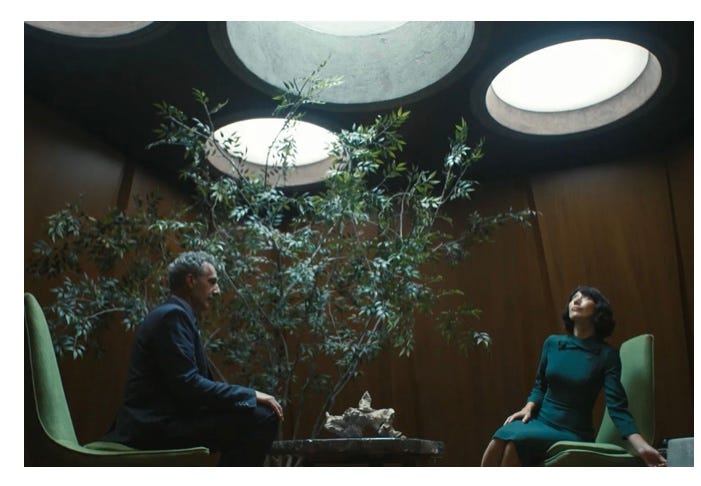A Severed Critique
“We live in the age of Apple, Amazon and Google. Why is our fictional model of oppressive corporate power IBM circa 1965?”
In the last week I‘ve been watching Severance on Apple TV – a programme about a group of office workers who undergo a techno-medical procedure to have their work memories and personal life memories permanently separated, so each half of their life cannot remember the other.
This is overseen by a massive, sinister corporation called Lumon, and as the series proceeds it turns out there’s more to this situation than meets the eye etc etc. It’s a great show and you should watch it - anyone who liked Eternal Sunshine of the Spotless Mind, the works of Philip K. Dick, or conceptual sci-fi in general would get a kick out of it.
It’s expensive and pretty, and one of the things I noticed was presentation of the workers, their work spaces, and corporate culture generally. We live in a time of suffocating corporate dominance. So how does a 21st Century present TV show a corporate dystopia? The answer is it refers back to the period between the 50’s and 70’s.
This is as much about the feel as the look, but here are some shots from a Vulture article on the design of the show to give you an idea of what I’m talking about.
Fluorescent lighting, office cubicles, mid-century modern furniture, chunky ties, short sleeve shirts with pens in the pocket, elevator muzak as you patrol the endless corridors, brick-ton computers with fat keyboards and screens that display only text, communication between rooms via radio intercoms that crackle with soft static. When the office workers celebrate they eat melon out of paper cups.
We live in the age of Apple, Amazon and Google. Why is our model of oppressive corporate power IBM circa 1965?
The forgivable reason is that this is just a fun style – it’s a little played out, but it gives the show a distinct feel; choosing to use purely a 2022 reference points you run the risk of dating faster, and making it look and feel forgettable. Visually, this style has been adopted to a degree by corporations in how they present themselves, and has filtered throughout the rest of society, demonstrated by the ubiquity of MCM furniture.
The other answer is that Hollywood is incapable of challenging corporate powers of today because those powers leverage the core beliefs of Hollywood artists.
In the last week the head of the company that owns British Gas appeared in the Times wearing a hoodie that said “why be racist, sexist, homophobic or transphobic when you could just be quiet.” The caption below the photo of him wearing this item said “Chris O’Shea has cut 5000 jobs and embarked on a bruising fire and rehire showdown with British Gas engineers.” In the interview he cited Muhammad Ali as his personal hero “because of the way he participated in the civil rights movement”.
This was also the week where the conflict between Disney and the Florida government intensified over what has been described as the “Don’t Say Gay” bill; a conservative activist published one video of a Disney Corporate President reinforcing company opposition to the bill by opening an address to staff with “I am here as the mother of two queer children; one transgender child and one pansexual child”; and another of a Disney employees emphasising their commitment to “exploring queer stories”.
I’m not convinced of the existence of the thing called Woke Capital at all. I think there’s a great argument that these are simply the public values of the wealthy, educated people who comprise middle and senior management at these institutions. There’s also a good argument that none of the corporations involved in socially progressive causes believe them at an institutional level – that they simply understand them as ways of building social capital, that their allegiance to the ideals in many cases doesn’t go far beyond saying them out loud and making showy public gestures; and that where the values conflict with profits they will be dropped. I don’t deny Woke Capital exists, just that it’s debatable.
But it’s undeniable that rhetorical and actual alignment with socially progressive ideals is a central plank of how corporate power is exercised and expressed today. It’s the velvet glove that the iron fist of 21st century feudalism is hidden in.
Conceptually Hollywood struggles with this, because it is aligned to these ideals – and when I say “it”, I mean both the entertainment corporations themselves and the artists they employ, from directors to script writers to actors.
We saw this in the Movie “Don’t Look Up” – if you haven’t seen it, don’t watch it, it’s terrible. But one of the key villains in the movie is a Steve Jobs/ Bill Gates analogue played by Mark Rylance. He allies himself with the Trump analogue (Meryl Streep) and together they conspire to make a climate catastrophe worse for their mutual benefit.
This critique of corporate and political power coming together to shaft the little guy is fine as far as it goes. But it rings false because the tech billionaire who wants to publicly align with populist-right politicians is the exception rather than the rule (the reason you can think of Musk and Thiel is that they’re the only ones).
In the 2016 & 2020 US elections donations from Tech went in one partisan direction only, and it wasn’t to the right. During Trump’s reign CEOs fought to publicly be the best at scolding him and distancing themselves from him. They often did this by extravagant donations to fringe left wing causes. That is the reality of how corporate and political ideals overlap publicly in the real world.
Severance can walk up right to the line, accurately parodying the fake engagement baby-talk that took hold in companies since the 1970s. The office middle manager, the soothing and sinister Mr. Milchick will say things like “It’s a good time to remind ourselves that things like death happen outside of here. Not here. Life at Lumon is protected from such things.”
But neither Severance nor any other show can fully parody the 21st century versions of corporate values and corporate power, because its creators agree with those values and how that power is used, at least superficially. All this is a reminder of the need for people willing to critique the current culture to find some way of expressing that unease in fictional and entertainment form, and of sneaking it into the mainstream; because the mainstream (and its employees) is compromised on these issues and can’t be relied on to do it itself, no matter how entertaining its output otherwise is.







Silicon Valley made some attempts at this, but a lot of it was Bay Area insider type stuff less accessible to the average viewer. It mocked woke tech, and dumb capital, but not really woke capital (rather positing borderline woke critiques of venture capital).
But it is kinda strange that the two best examples of mockery of contemporary professional class life that I can think of were done by the same guy, Mike Judge, almost 20 years apart.
Yup, just more virtue signaling, without the actual performed virtue. I'm amazed more people haven't snapped out of it, especially over the last couple years. I'm reminded of Linkedin—one empty facade.